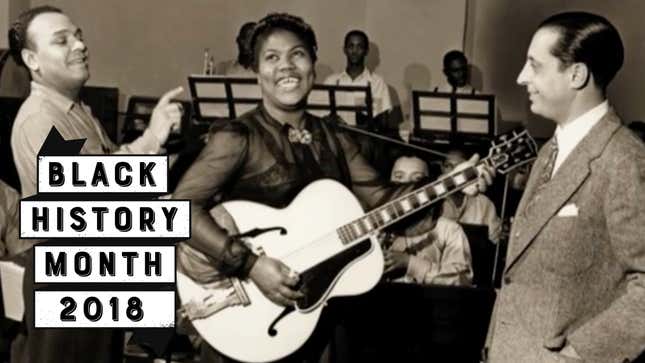
The first time I heard Sister Rosetta Tharpe, I cried real tears. Not because her distinct sound of music sounded as if one of God’s angels drank a fifth of gin and figured out a way to plug an extension cord into its harp. It wasn’t because I was listening to something that was recorded in the 1930s that sounded like Prince had laid it down in a studio yesterday.
It was the erasure.
Because not finding out about Sister Rosetta Tharpe’s existence until my third decade on the planet meant everything could be a lie. If an intentional omission can delete an entire human being from history, then nothing means anything.
The title of this article is not hyperbole. It is truth. It is an indisputable fact.
Invent: (verb) to create or design (something that has not existed before)
It is as simple as this: What we know as rock ’n’ roll did not exist before Sister Rosetta Tharpe. She came before Elvis and Johnny Cash. She preceded Chuck Berry and Little Richard.
When most music historians are asked who invented this class of music, many will name one of the previously mentioned rock stars. The most respectful and thoughtful will say it was a combination of these men.
But every single one of those men, including Little Richard, will tell you that the first person from whom they heard the sound with which we have become familiar was Rosetta Tharpe.
In his induction into the Rock and Roll Hall of Fame, Johnny Cash said that she was his favorite singer growing up. Little Richard called her his greatest influence. Chuck Berry said that his entire career was just “one long Rosetta Tharpe impersonation.”
A PBS documentary on her life called her the “godmother of rock and roll.” She is still called the “forgotten mother” of the genre and “the most influential artist ever.”
Maybe she is overlooked because she was technically a gospel singer (because rock didn’t exist yet, remember?). Perhaps Tharpe’s blackness has something to do with the fact that she wasn’t elected to the Rock and Roll Hall of Fame until 2017. Or her queerness. Or the fact that she was a woman.
Music authorities argue about a handful of songs recorded between 1946 and 1952 when discussing what might be the first rock ’n’ roll song ever, the most popular of which is “Rocket 88” by Jackie Brenston and His Delta Cats, recorded in 1952.
On Oct. 31, 1938, when Elvis was 3 years old, when Chuck Berry was 12, when Little Richard (who is rarely disputed when he says he “invented” rock ’n’ roll) was 6 years old, and when Jackie Brenston and His Delta Cats were still kittens, Sister Rosetta Tharpe recorded this song for posterity:
“Music authorities” are a motherfucking lie.
Once more, for the people in the back: Sister Rosetta Tharpe invented rock ’n’ roll.
Rosetta Nubin was born in 1915 in Cotton Plant, Ark. By the time she was 6 years old, she was performing in churches around the South with her mother. After moving to Chicago as a child, Rosetta married a Church of God in Christ preacher named Thomas Tharpe after she became a renowned gospel musician in the COGIC community. Rosetta would divorce her husband after a few years, but she kept the surname as her stage moniker.
During a time when the idea of a guitar-playing woman was nonexistent, not only did Rosetta Tharpe erase this line by mastering the symbol of musical masculinity, but her blend of gospel and secular music was seen as earth-shattering. Her willingness to play “God’s music” in the devil’s den of nightclubs and music halls caused an uproar.
After a move to New York, she began playing with some of the biggest bands in the country, including Duke Ellington’s. By the time she was 23, she had a recording contract, and recorded Decca Record’s first gospel songs in 1938, including the hit song “Rock Me.”
When people heard her music, Tharpe became an overnight sensation, and her music became the first gospel music to ever top Billboard’s “race” charts, an accomplishment she achieved several times during her career. People often commented that she “played like a man,” to which Tharpe often replied: “Can’t no man play like me. I play better than a man.”
Even though she was playing venues like Carnegie Hall and the Cotton Club with legendary acts such as Cab Calloway, Tharpe longed to get back to the gospel music circuit. After meeting gospel singer Marie Knight in 1946, Tharpe entered into a relationship with Knight and lived openly in the relationship until it ended in 1951.
With the move to folk music and the British invasion that rejuvenated musicians of her era in the 1960s and 1970s, Tharpe didn’t get the same bump that male blues musicians did because she continued to stick to gospel-themed music. She died during a recording session on Oct. 9, 1973, when she suffered her second stroke.
Sister Rosetta Tharpe was not an unknown, hidden little secret. She was such a huge star, she had her third wedding in a stadium where 25,000 people attended. Yet she was somehow erased from the history of music.
Most reasonable music historians will tell you that one person shouldn’t receive credit for an entire genre. While it is true that not every single musician who ever played rock ’n’ roll was inspired by Rosetta Tharpe, it is also true that there is not a single rock musician playing in the year 2018 doing something that Rosetta Tharpe wasn’t doing 80 years ago.
She did it first.
That’s what “invent” means.

